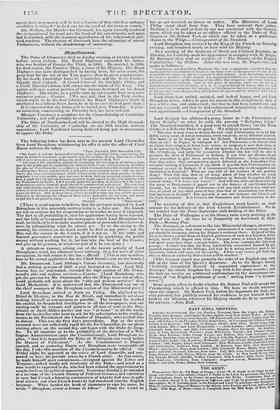Lord Kenyon has addressed a prosy letter to " the Protestants
of (heat Britain," on what he calls the present " Religious Crisis." The Standard considers it a good text to preach from ; but the Times thinks it will do the Duke no good. We subjoin a specimen.
" The time is now come to declare for real vital Christianity, or to let Infi- delity sweep away all motel restraints, every social tie, every domestic comfort. The battle is to he fought in and for Ireland. Is Protestantisui to remain there or not ? Is Popery to extirpate it ? Are Protestants to be forced either to abjure their religion at home from terror, to emigrate to save their lives, or to be massacred by Popish fury ? Read the speech, my Protestant brethren, of Mr. O'Sullivan, and judge for yourselves whether the law will be able to preserve the lives of Protestants in Ireland, if you who are electors do nut exert yourselves to give them protection in Parliament. Judge, on reading that imp.cssive, that overpowering speech delivered at the Lancashire Con- servative meeting at Liverpool, if you think it possible that Protestantism can continue to exist in Irelaod, if a Government favourable to its support is not established in England ? What are you told of the conduct of our gracious King? What but this, that on its being asked of him whether he would sanction a partial extinction of Protestantism in Ireland, he replied, like his sainted father, " I wird. nix FIRST " And will any who call themselves by the name of I'rotestants—I appeal not to the denyers of our blessed Lord's hut to Christian Protestants—will any such yield to any other mo- tive, or admit of any other sense of duty than that of maintaining our Protes- tant brethren in Ireland ? The question is not one between the Church and the Irish Romanist's. It is between the Humanists and Protestantism in Ire- land."
The meaning of this is, that Englishmen must buckle on their armour for the defence of the Irish Church Establishment. We do not wonder that the Times deprecates such backing of the Duke.
The Duke of Wellington is at his library table every morning at the hour of six, a.m. At nine he is frequently on horseback in Hyde Park.—Morning Post. The Scotsman, in reference to the late Ministerial changes, observes- " It is remarkable, that some obscure intimations of a coming change had gut abroad in Germany, during her Majesty's residence there. In proof of this, we were shown a letter from an English gentlemen of rank to a friend in Edin- burgh, dated 27th August last, from a German town, in which her Majesty bad spent SOUme days about a round' before. The letter contains the following passage: ' I much fear that the King has foolishly committed himself by in"- guarded expressions to the Bishops, and that he is acting another part to his Ministers, width will come out by and by. I hare some reason for belnerny this on German authority that cannot well be doubted."
[This German report was probably the echo of an English one, very rife at the time of the Queen's departure. As to the King's having " foolishly committed himself by unguarded expressions to the Bishops," the whole kingdom has rung with it for many months ; and the fact can receive no additional confirmation by the anonymous tes- timony of "an English gentleman of rank," writing from "a German town.") Some people affect to doubt whether Sir Robert Peel will accept the Premiership which is offered to him. We have no doubt whatever upon the subject. Sir Robert Peel, before his departure for Italy, not only privately but publicly avowed his readiness to put himself at the head of the Ministry whenever his Majesty should see fit to command his services. —John Bull.




















 Previous page
Previous page